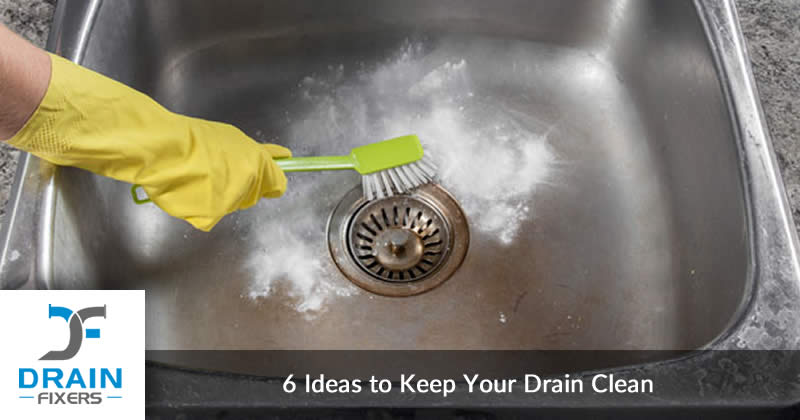Drains are a part of a home that most people don’t think about on a daily basis. They aren’t fancy, just functional, and are supposed to just work. Unfortunately, drains need maintenance, too. All sorts of items can build up over time and cause clogs, which are very expensive to repair.
However, with a little care and consistent maintenance, it’s easy enough to keep your pipes clear so they flow freely. Here are five practical tips for preventing blocked drains in Melbourne and avoiding unnecessary repairs.
1. Watch what goes down the drain
Taking a second or two to think about what you’re putting down your drain when washing up after dinner, or cleaning, can go a long way to preventing harmful substances from building up in your pipes. Those cooking oils and coffee grounds might look harmless, but they can become a real problem, sticking to pipe walls and eventually putting the brakes on your water flow.
Always try to collect things like grease, oils, food scraps, and grounds in a container rather than flushing them away with water. You can then dispose of them in the waste.
Two other tips that might help:
- Use hair catchers to stop hair from tangling around the plug hole in your bath or shower.
- Brush your drain at regular intervals to get rid of surface buildup before it goes deeper.
2. Use biological cleaners, not chemical ones
Chemical drain cleaners might seem like a good idea when shopping at the local supermarket. They are cheap and convenient. However, a quick fix can soon become a problem for your plumbing system. Many chemical drain cleaners shouldn’t be used regularly. Here’s why:
- The strong acids and alkalis in them cause pipe damage over time.
- The chemicals in them can be toxic and harm the environment.
- They can also irritate your eyes and skin with spills and splashes posing a danger.
It’s better to use biological cleaners. These have natural enzymes and bacteria that break down things in your pipe, but do it gently, without corroding or weakening its structure. They are also safer for you to use and can have a lasting impact — the enzymes work long after being applied.
3. Stick to a cleaning routine
Drain cleaning ‘once in a blue moon’ isn’t enough. If you allow oils and debris to accumulate for months or even years, you’ll have a harder time shifting them later. It’s best to stick to a regular cleaning schedule, preferably once a week, just by pouring hot water down the drain for a minute or two. This loosens the buildup and gets rid of smaller debris.
You can also:
- Wash down a mixture of baking soda and vinegar with hot water every month in kitchens for a deeper clean.
- Allow your sinks and showers to dry to prevent standing water from gathering. This prevents mould growth and buildup.
4. Install mesh screens
It’s hard to prevent everything from entering your sink, even if you’re trying your best to put oils and scraps elsewhere. The best way to catch food particles, soap scum, and other detritus is with low-cost mesh screens. These simple devices act as strainers, filtering out larger bits of debris before they cause any problems.
You can install mesh screens in most places — bathroom sinks, kitchen sinks, showers, and even outdoor drains. All you have to do is empty it into the rubbish bin every few days. It’s a very convenient first line of defence against clogs.
5. Tackle grease with a heating pad
Hot water isn’t the only tool for combating grease. The main issue with grease is that it solidifies after it cools, making it a really stubborn substance to move. Heating pads solve this problem by heating up grease so it melts away. You still need the trusty hot water to finish the job, though.
Here’s what to do:
- Wrap a heating pad around the pipe under your sink.
- Run hot water down your sink for just a few minutes.
- Follow up with other cleaning methods a few days later, like biological cleaners.
Bonus tips for long-term drain health
We’re not finished yet. Here are three more drain repair tips for keeping your system clean year-round.
1. Avoid flushing non-degradable items
There are some things that should never go near a drain. Items like baby wipes or sanitary products are one of the worst culprits for clogged drains. Only flush toilet paper down your toilets.
2. Be mindful of outdoor drains
Outdoor spaces can cause problems for plumbing too. Over time, leaves and soil can enter the drainage system and block pipes. Try to clean your gutters and outdoor drains regularly to prevent blockages that lead to slow drainage and unpleasant odours.
3. Schedule professional inspections
Finally, even the best home maintenance might not be enough to prevent issues from arising. Scheduling regular professional drain cleaning and inspections is the best way to catch problems you might miss with the naked eye from becoming expensive repair jobs in the future.
Keep your drains clean with Drain Fixers
Keeping your drains clean doesn’t have to be complex or expensive. Just a few cheap tools and simple habits, completed regularly, can keep those pesky pipe build-ups at bay. However, if you do run into bigger issues, don’t stress. Drain Fixers is just a call away. Our team of professionals can complete a thorough inspection of your system and recommend a maintenance plan or emergency repairs.
Contact us today for the best drain cleaning services in Melbourne.
